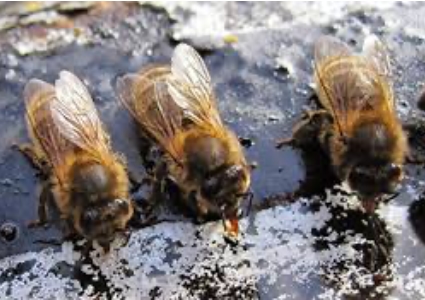Polling

Honeybees

We are very dependent upon honeybees to pollinate many of our crops such as apples, almonds, avocados, cherries, strawberries, blueberries, broccoli, soybeans and more. These pollinators provide at least $25 billion in economic benefits to our farmers each year. There are now about 2.6 million bee colonies in the U.S., down from 3 million in 1990 and less than half of the 6 million there were in 1947. Colony collapse disorder (CCD) is a phenomenon in which worker bees from beehives abruptly die or disappear. A recent CCD study released by our Agriculture Department citied the increasing pressures of climate change, habitat destruction, pesticide use and disease as the probable causes of honeybee decline. The first-ever honeybee vaccine has recently been approved for foulbrood disease, an aggressive fatal bacterium that can spread quickly from hive to hive. This vaccine is fed to worker bees who incorporate the vaccine into royal jelly, which they feed to the queen bee. Once consumed, fragments of the vaccine are deposited in the queen’s ovaries so her larvae will be born with immunity to this disease.
Although pesticide manufacturers claim their products are not the cause of CCD, advocates say science shows otherwise. A class of pesticides known as neonicotinoids, a neuroactive insecticide chemically similar to nicotine, is strongly suspected to be a main cause of CCD. Neonicotinoids, or neonics as they are called, impair a honeybee’s neurological functions including memory, cognition and behavior – scrambling their navigation function and ability to forage. Scientists say nicotine-addicted bees prefer food tainted with neonic pesticides to non-treated food and their studies have shown bees to be as susceptible to nicotine addiction as humans.
Pending Legislation: H.R.4277 - Saving America’s Pollinators Act of 2023
Sponsor: Rep. Earl Blumenauer (OR)
Status: House Subcommittee on Conservation, Research, and Biotechnology (Agriculture)
Chair: Rep. James Baird (IN)
Although pesticide manufacturers claim their products are not the cause of CCD, advocates say science shows otherwise. A class of pesticides known as neonicotinoids, a neuroactive insecticide chemically similar to nicotine, is strongly suspected to be a main cause of CCD. Neonicotinoids, or neonics as they are called, impair a honeybee’s neurological functions including memory, cognition and behavior – scrambling their navigation function and ability to forage. Scientists say nicotine-addicted bees prefer food tainted with neonic pesticides to non-treated food and their studies have shown bees to be as susceptible to nicotine addiction as humans.
Pending Legislation: H.R.4277 - Saving America’s Pollinators Act of 2023
Sponsor: Rep. Earl Blumenauer (OR)
Status: House Subcommittee on Conservation, Research, and Biotechnology (Agriculture)
Chair: Rep. James Baird (IN)
Suggestion
Poll Opening Date
January 20, 2025
Poll Closing Date
January 26, 2025
